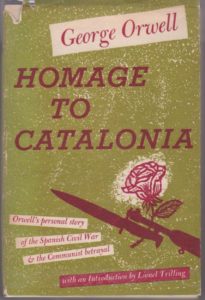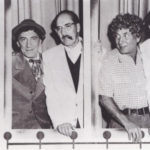George Orwell ~ Homage To Catalonia
No Comments yetIn the Lenin Barracks in Barcelona, the day before I joined the militia, I saw an Italian militiaman standing in front of the officers’ table.
He was a tough-looking youth of twenty-five or six, with reddish-yellow hair and powerful shoulders. His peaked leather cap was pulled fiercely over one eye. He was standing in profile to me, his chin on his breast, gazing with a puzzled frown at a map which one of the officers had open on the table. Something in his face deeply moved me. It was the face of a man who would commit murder and throw away his life for a friend–the kind efface you would expect in an Anarchist, though as likely as not he was a Communist. There were both candour and ferocity in it; also the pathetic reverence that illiterate people have for their supposed superiors. Obviously he could not make head or tail of the map; obviously he regarded map-reading as a stupendous intellectual feat. I hardly know why, but I have seldom seen anyone–any man, I mean–to whom I have taken such an immediate liking. While they were talking round the table some remark brought it out that I was a foreigner. The Italian raised his head and said quickly:
‘Italiano?’
I answered in my bad Spanish: ‘No, Ingles. Y tu?’
‘Italiano.’
As we went out he stepped across the room and gripped my hand very hard. Queer, the affection you can feel for a stranger! It was as though his spirit and mine had momentarily succeeded in bridging the gulf of language and tradition and meeting in utter intimacy. I hoped he liked me as well as I liked him. But I also knew that to retain my first impression of him I must not see him again; and needless to say I never did see him again. One was always making contacts of that kind in Spain.
I mention this Italian militiaman because he has stuck vividly in my memory. With his shabby uniform and fierce pathetic face he typifies for me the special
atmosphere of that time. He is bound up with all my memories of that period of the war–the red flags in Barcelona, the gaunt trains full of shabby soldiers
creeping to the front, the grey war-stricken towns farther up the line, the muddy, ice-cold trenches in the mountains.
This was in late December 1936, less than seven months ago as I write, and yet it is a period that has already receded into enormous distance. Later events
have obliterated it much more completely than they have obliterated 1935, or 1905, for that matter. I had come to Spain with some notion of writing newspaper articles, but I had joined the militia almost immediately, because at that time and in that atmosphere it seemed the only conceivable thing to do. The Anarchists were still in virtual control of Catalonia and the revolution was still in full swing.
To anyone who had been there since the beginning it probably seemed even in December or January that the revolutionary period was ending; but when one came straight from England the aspect of Barcelona was something startling and overwhelming. It was the first time that I had ever been in a town where the working class was in the saddle. Practically every building of any size had been seized by the workers and was draped with red flags or with the red and black flag of the Anarchists; every wall was scrawled with the hammer and sickle and with the initials of the revolutionary parties; almost every church had been gutted and its images burnt. Churches here and there were being systematically demolished by gangs of workmen. Every shop and cafe had an inscription saying that it had been collectivized; even the bootblacks had been collectivized and their boxes painted red and black. Waiters and shop-walkers looked you in the face and treated you as an equal. Servile and even ceremonial forms of speech had temporarily disappeared. Nobody said ‘Senior’ or ‘Don’ or even ‘Usted’; everyone called everyone else ‘Comrade’ and ‘Thou’, and said ‘Salud!’ instead of ‘Buenos dias’. Tipping was forbidden by law; almost my first experience was receiving a lecture from a hotel manager for trying to tip a lift-boy. There were no private motor-cars, they had all been commandeered, and
all the trams and taxis and much of the other transport were painted red and black. The revolutionary posters were everywhere, flaming from the walls in
clean reds and blues that made the few remaining advertisements look like daubs of mud. Down the Ramblas, the wide central artery of the town where crowds of people streamed constantly to and fro, the loudspeakers were bellowing revolutionary songs all day and far into the night. And it was the aspect of the crowds that was the queerest thing of all. In outward appearance it was a town in which the wealthy classes had practically ceased to exist. Except for a small number of women and foreigners there were no ‘well-dressed’ people at all.
Practically everyone wore rough working-class clothes, or blue overalls, or some variant of the militia uniform. All this was queer and moving. There was much in it that I did not understand, in some ways I did not even like it, but I recognized it immediately as a state of affairs worth fighting for. Also I
believed that things were as they appeared, that this was really a workers’ State and that the entire bourgeoisie had either fled, been killed, or voluntarily come over to the workers’ side; I did not realize that great numbers of well-to-do bourgeois were simply lying low and disguising themselves as proletarians for the time being.
The complete book: http://www.george-orwell.org/Homage_to_Catalonia/
You May Also Like
Comments
Leave a Reply








